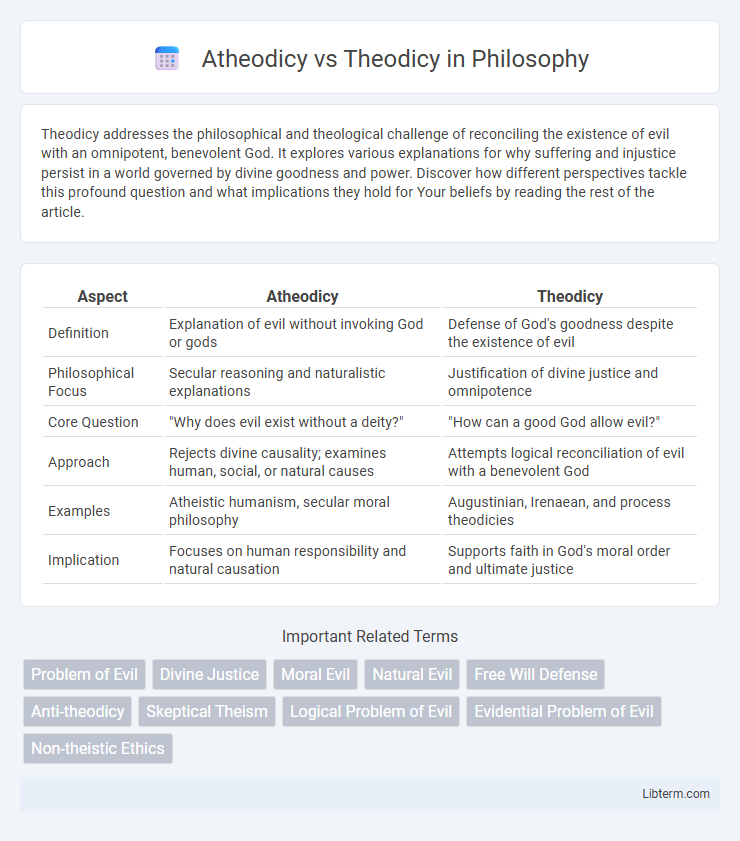Theodicy addresses the philosophical and theological challenge of reconciling the existence of evil with an omnipotent, benevolent God. It explores various explanations for why suffering and injustice persist in a world governed by divine goodness and power. Discover how different perspectives tackle this profound question and what implications they hold for Your beliefs by reading the rest of the article.
Table of Comparison
| Aspect | Atheodicy | Theodicy |
|---|---|---|
| Definition | Explanation of evil without invoking God or gods | Defense of God's goodness despite the existence of evil |
| Philosophical Focus | Secular reasoning and naturalistic explanations | Justification of divine justice and omnipotence |
| Core Question | "Why does evil exist without a deity?" | "How can a good God allow evil?" |
| Approach | Rejects divine causality; examines human, social, or natural causes | Attempts logical reconciliation of evil with a benevolent God |
| Examples | Atheistic humanism, secular moral philosophy | Augustinian, Irenaean, and process theodicies |
| Implication | Focuses on human responsibility and natural causation | Supports faith in God's moral order and ultimate justice |
Introduction to Theodicy and Atheodicy
Theodicy addresses the philosophical challenge of reconciling the existence of evil with an omnipotent, omnibenevolent God, seeking to justify divine goodness despite suffering. Atheodicy, by contrast, critically examines this justification from an atheistic perspective, often rejecting the necessity of a deity to explain evil or suffering. Both concepts are central to debates in philosophy of religion and theology, exploring fundamental questions about the nature of divinity and morality.
Defining Theodicy: Justifying Divine Goodness
Theodicy explores philosophical and theological efforts to justify divine goodness despite the existence of evil and suffering in the world. It addresses the apparent contradiction between an omnipotent, omnibenevolent God and the reality of moral and natural evil, seeking explanations that uphold God's righteousness. In contrast, atheodicy questions or rejects divine justification altogether, often emphasizing reason and empirical evidence over faith-based interpretations.
Understanding Atheodicy: Questioning God’s Role
Atheodicy critically examines the notion of divine justice by questioning the existence or benevolence of God in the face of suffering and evil. Unlike theodicy, which seeks to justify God's goodness and omnipotence, atheodicy challenges traditional religious explanations and highlights contradictions in the concept of an all-powerful, all-loving deity. This perspective leverages philosophical arguments and empirical observations to scrutinize the validity of belief systems centered on divine morality.
Historical Development of Theodicy
Theodicy, rooted in ancient philosophical and theological traditions, emerged to address the problem of evil by justifying God's goodness despite suffering and injustice, with pivotal contributions from thinkers like Augustine and Leibniz shaping its classical framework. Atheodicy, in contrast, critiques or rejects theodicy by denying the existence of a benevolent deity, often gaining prominence during Enlightenment skepticism and modern secular humanism. The historical development of theodicy reflects an evolving dialogue between theists and atheists, highlighting contrasting views on divine justice and the nature of evil.
Philosophical Foundations of Atheodicy
Atheodicy challenges the traditional theodicy framework by rejecting the existence of a benevolent deity and instead addresses the problem of evil through secular or naturalistic explanations. Philosophical foundations of atheodicy often draw on empirical evidence, ethical naturalism, and existentialist critiques, emphasizing human responsibility and the absence of divine intervention in moral order. This approach contrasts with theodicy by seeking coherence between evil and suffering without invoking supernatural justification.
Major Arguments in Defense of Theodicy
Theodicy addresses the problem of evil by justifying God's goodness despite the existence of suffering, often citing free will as a primary defense, arguing that human choice necessitates the possibility of evil. Another major argument is the soul-making theodicy, which suggests that challenges and suffering are essential for spiritual growth and moral development. In contrast, atheodicy rejects these justifications, maintaining that the coexistence of evil and an omnipotent, benevolent God is logically inconsistent.
Critiques and Counterarguments: The Rise of Atheodicy
Atheodicy challenges traditional theodicy by rejecting the notion of a benevolent deity while addressing the problem of evil through secular or naturalistic explanations. Critics argue that atheodicy lacks a cohesive moral framework, but proponents counterclaim it offers a realistic acknowledgment of suffering without invoking divine justification. The rise of atheodicy highlights growing dissatisfaction with traditional theodicy's reliance on faith-based premises, emphasizing empirical evidence and human responsibility instead.
The Problem of Evil: Divergent Perspectives
Theodicy explores justifications for the existence of evil within a world governed by an omnipotent, omnibenevolent God, addressing the problem of evil through arguments like free will and soul-making. Atheodicy, by contrast, questions or denies traditional theistic explanations, often asserting that the presence of evil challenges or contradicts the notion of a benevolent deity. This divergence reflects fundamental differences in interpreting suffering, morality, and divine nature in philosophical and theological discourse.
Contemporary Debates: Atheodicy vs Theodicy in Modern Thought
Contemporary debates on Atheodicy versus Theodicy center on the problem of evil and the justification of divine attributes in light of suffering. Theodicy attempts to reconcile God's omnipotence and benevolence with the existence of evil, often through frameworks such as free will or soul-making defense. Atheodicy challenges the coherence of theistic claims, arguing that the presence of gratuitous evil undermines belief in an all-powerful, all-good deity, fueling ongoing philosophical and theological discourse.
Implications for Faith, Ethics, and Society
Atheodicy challenges theistic claims by attributing evil and suffering to the absence of divine justice, compelling believers to reassess faith foundations and moral frameworks. Theodicy seeks to reconcile God's goodness with worldly suffering, reinforcing ethical behavior through the promise of divine purpose and ultimate justice. These contrasting views deeply influence societal norms by framing human responsibility either under divine sovereignty or secular causality, shaping collective responses to injustice and morality.
Atheodicy Infographic

 libterm.com
libterm.com